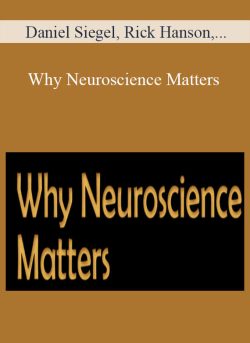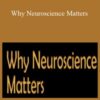$299.00 Original price was: $299.00.$74.00Current price is: $74.00.
Digital Download: You will receive a download link via your order email
Save up to 85% compared to Salepage prices. In addition, earn additional points. Save more on your next order.
Please contact email: wixzip.cs@gmail.com if you have any questions about this course.
 Purchase this course you will earn 74 Points worth of $7.40
Purchase this course you will earn 74 Points worth of $7.40Elevate your skills with the Daniel Siegel, Rick Hanson, Norman Doidge, Stephen Porges, and more! – Why Neuroscience Matters course, available for just $299.00 Original price was: $299.00.$74.00Current price is: $74.00. on Utralist.com! Browse our curated selection of over 60,000 downloadable digital courses across diverse Health and Medical. Benefit from expert-led, self-paced instruction and save over 80%. Start learning smarter today!
 Daniel Siegel, Rick Hanson, Norman Doidge, Stephen Porges, and more! – Why Neuroscience Matters
Daniel Siegel, Rick Hanson, Norman Doidge, Stephen Porges, and more! – Why Neuroscience Matters
We’ve all been dazzled by the findings of neuroscience and the brain’s capacity to re-wire itself and grow new neural pathways. But for many of us, the question remains—How do I use these findings to help my clients in concrete and practical ways?
To answer your questions about practical applications of brain science, we invited leading brain science experts to be part of our online video course—Why Neuroscience Matters.
This series is designed to enhance your clinical skills, speed up healing, and transform your clients’ lives by translating complex concepts like neuroplasticity and brain integration into real world therapeutic procedures. It covers:
- The “how-to’s” of using brain-based therapies for moving clients through trauma, anxiety, and depression more fully and quickly than ever
- Steps for assessing clients’ brain integration, setting therapeutic goals, and conducting sessions based on brain science insights
- Clinical strategies that harness the brain’s ability to rewire itself
- Principles for identifying a client’s “sweet spot” for effective learning, retention, and lasting change
- Gender-based brain differences and which approaches work best with men and women
You’ll learn proven, practical approaches and interventions from the leading innovators in brain science:

Daniel Siegel, M.D.
Enhance your effectiveness by applying neurobiological principles and learn about:
- A unique working definition of the mind—encompassing brain, body, relationships, and more
- Brain integration—what it is, why it’s key to mental health, and how to help clients achieve and maintain it
- How to accurately assess your clients for balance versus rigidity and use this information to map a pathway to healing
- How to use specific interventions that target different parts of the brain
Dan Siegel is one of the pioneers in bringing brain science into clinical practice. His books include Brainstorm, Mindsight, and The Mindful Therapist.
Speaker Disclosure
Financial: Dr. Daniel J. Siegel is a clinical professor at the UCLA School of Medicine. He is the executive director of the Mindsight Institute. He is an author for W.W. Norton publishing and receives royalties. He is an author for Bantam publishing and receives royalties. He is an author for Guilford Press and receives royalties. He is an author for Tarcher/Penguin and receives royalties. He is an author for Random House and receives royalties. He receives a speaking honorarium from PESI, Inc.
Non-Financial: Dr. Daniel J Siegel has no relevant non-financial relationship to disclose.

Rick Hanson, Ph.D.
Apply Positive Psychology insights to help clients reshape their brains by:
- Learning to build new neural structures
- Activating and installing resource states
- Changing channels on the “inner juke box”
- Developing targeted antidote experiences
- Savoring and internalizing positive experience
Rick Hanson is a neuropsychologist noted for his explorations of the intersection of psychology, neurology, and Buddhism. He’s the author of Buddha’s Brain and Hardwiring Happiness.
Speaker Disclosure
Financial: Rick Hanson is in private practice. He receives a speaking honorarium from PESI, Inc.
Non-financial: Rick Hanson has no relevant non-financial relationship to disclose.

Norman Doidge, M.D.
Explore new and challenging perspectives on:
- The limits of the hardwired brain
- How thought changes matter
- The plasticity paradox
- The brain as a muscle
- The “ski slope” model of brain change
Norman Doidge is one of our leading authorities on neuroplasticity and other cutting edge developments in brain science. His books include The Brain That Changes Itself.

Stephen Porges, Ph.D.
Enhance your ability to work with traumatized clients by learning:
- How the social engagement system complements the sympathetic and parasympathetic nervous system
- The therapeutic power of facial expression, eye contact, voice modulation, and listening
- How Polyvagal Theory can enhance trauma treatment
Stephen Porges is the developer of Polyvagal Theory, a widely influential expansion of our understanding of the autonomic nervous system. He’s the director of the Brain-Body Center in the College of Medicine at the University of Illinois at Chicago.
Speaker Disclosure
Financial: Stephen Porges is a professor at the University of North Carolina. He is an author for W. W. Norton and receives royalties. Dr. Porges receives a speaking honorarium from PESI, Inc.
Non-financial: Stephen Porges has no relevant non-financial relationship to disclose.

Louann Brizendine, M.D.
Increase your ability to attune to both male and female clients by understanding the gender-differentiated brain and:
- How gender differences develop
- How becoming a caretaker shapes the female brain
- The link between reproductive drive and the male brain
- The stages of adolescent brain development
Louann Brizendine is noted for her provocative work on gender and brain development. She’s the author of bestsellers The Female Brain and The Male Brain.
Dan Siegel, M.D. and Rick Hanson, Ph.D.
Dan Siegel and Rick Hanson address how we can separate hype and pseudo-science from clinically relevant facts about the brain, plus ways in which understanding neuroscientific principles can actually make you a more effective therapist. They’ll examine:
- The benefits, side effects, and limitations of getting to know the brain
- How therapists can use brain science to better understand and facilitate the client’s change process
- Recent criticisms of “mindless” neuroscience that point to what can sometimes be a dangerous allure of brain research
- Ways in which neuroscientific research has informed and expanded the field of psychotherapy, for better and for worse

Rick Hanson, Ph.D.
In his Keynote address from Symposium 2014, Rick Hanson explores the current field of brain science and looks ahead at what the future of brain science holds. You’ll learn about:
- The clinical benefits and potential pitfalls of using neuroscientific concepts in the consulting room
- The tools that brain science has already given psychotherapists
- The next stage of brain science and how we might use it to enhance our clinical craft
Rick Hanson is a neuropsychologist noted for his explorations of the intersection of psychology, neurology, and Buddhism. He’s the author of Buddha’s Brain and Hardwiring Happiness.
Speaker Disclosure
Financial: Rick Hanson is in private practice. He receives a speaking honorarium from PESI, Inc.
Non-financial: Rick Hanson has no relevant non-financial relationship to disclose.

David Grand, Ph.D.
Brainspotting, a brain-based method of clearing trauma blockage without clients having to talk about it, nurtures their capacity for natural self-healing. Through demonstrations and participation, David Grand explores how to:
- Identify how specific eye movements, other facial cues, and reflexes, reveal specific “spots” in the brain
- Understand “brainspots,” the eye positions associated with trauma activation
- Guide traumatized clients as they attend to their inner experience and move through dissociative blocks to maximize self-healing
- Develop skills that allow you to interact with clients while staying attuned to the brain changes reflected in their eye movements
David Grand has trained more than 8,000 therapists in Brainspotting internationally. He’s the author of Brainspotting: The Revolutionary New Therapy for Rapid and Effective Change and Emotional Healing at Warp Speed: The Power of EMDR.
Sale Page: https://catalog.pesi.com/sales/bh_c_001066_whyneuroscience_organic-16840
Archive: https://archive.fo/Xr3zg
Delivery Method
Be the first to review “Daniel Siegel, Rick Hanson, Norman Doidge, Stephen Porges, and more! – Why Neuroscience Matters” Cancel reply
Cultivate continuous growth with the Daniel Siegel, Rick Hanson, Norman Doidge, Stephen Porges, and more! – Why Neuroscience Matters course at Utralist.com! Unlock lifetime access to premium digital content, meticulously designed for both career advancement and personal enrichment.
- Lifetime Access: Enjoy limitless access to your purchased courses.
- Exceptional Value: Benefit from savings up to 80% on high-quality courses.
- Secure Transactions: Your payments are always safe and protected.
- Practical Application: Gain real-world skills applicable to your goals.
- Instant Accessibility: Begin your learning journey immediately after buying.
- Device Compatible: Access your courses seamlessly on any device.
Transform your potential with Utralist.com!
Related products
Health and Medical
CDT Dental Coding and Reimbursement Update: Identifying Common Practice Mistakes – Paul Bornstein
= 85 Points
Health and Medical
The Heart of Complex Cardiac Care: Strategies for Rapid Action – Marcia Gamaly, Robin Gilbert
= 85 Points
Health and Medical
= 74 Points
Health and Medical
= 33 Points
Health and Medical
= 85 Points
Health and Medical
= 18 Points
Health and Medical
= 28 Points




 Daniel Siegel, Rick Hanson, Norman Doidge, Stephen Porges, and more! – Why Neuroscience Matters
Daniel Siegel, Rick Hanson, Norman Doidge, Stephen Porges, and more! – Why Neuroscience Matters





Reviews
There are no reviews yet.